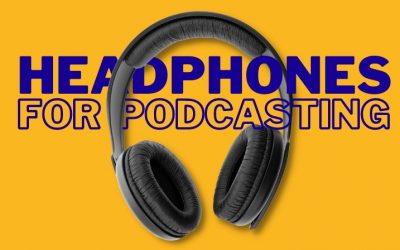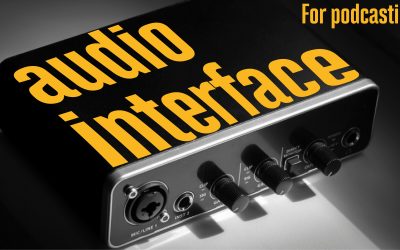You’re on the verge of creating your first podcast, or perhaps you already have one and wonder which microphone people use for podcasting and which one can record your vocals with the best sound quality.
This article will give you a complete guide to selecting the best microphone for podcasting based on budget and the skill level of your podcast.
Here we go!
Here’s the list of all the microphones reviewed in this article:
- Samson Q2U ( XLR+USB )
- ATR 2100X ( XLR+USB )
- Rode PodMic ( XLR )
- Shure MV7 ( XLR+USB )
All those mics offer high-quality audio through XLR connection which needs an audio interface to connect it to a PC, or you can choose one with USB to connect it directly to your computer.
In-depth review of each Microphone:
Samson Q2U

The Samson Q2U USB\XLR microphone is a very convenient mic for new podcasters. It is commonly referred to as the Q2U Recording and Podcasting Pack because the microphone comes with all the necessary gear and attachments for recording great-sounding projects.
Pros & Cons
Pros
- Has dual connection options (XLR analog output for connecting to an audio interface and USB digital output for computers and smartphones)
- Plug and play device, no drivers installation required to work with your computer
- Dynamic recording for canceling out ambient noise
- Affordable, price range between $50 to $70
- Compatible with most computer-based DAW (Digital audio workstations)
- High-quality audio output
- Lightweight
Cons
- Issues with USB connection to computers
- Sensitive to pop sounds
Features & Specifications
Type: Handheld
Brand: Samson
Connector Type: USB, XLR Connection
Dimensions: 10 x 7 x 3 inches
Frequency Response: Omni: 20Hz – 20kHz; 80Hz-18kHz
Weight: 0.75 pounds
Power Source: USB
Outstanding Features of the Samson Q2U Microphone
Versatile Connector Type
The flexible connection options of both USB and XLR output are the most appealing feature of this podcasting microphone. You can set up quickly with a PC using the USB pin. The USB connector also allows you to plug the microphone into your smartphone and record your podcast on the go.
The XLR connector offers a more sophisticated connection with mixers and audio interfaces. This connector produces a higher vocal output quality than the USB option.
Convenient Package of Accessories
All the gear you need to kick off the recording of your podcast project is present in the box. The pack has the mic itself, including a pop-filter for minimizing pops, an extended desktop stand, a mic clip for situating the microphone near the sound source, and the USB and XLR cables.
ATR 2100X

The Audio-Technica ATR2100x USB Dynamic Microphone is a long-lasting device with a durable metal body. It has a broad frequency response spectrum, a feature that qualifies it as one of the best microphones to record a podcast.
Pros and Cons
Pros
- Foldable tripod stand
- Extended frequency response
- USB and XLR connector alternatives
- Built-in headphone jack for monitoring audio output with adjustable headphone volume
- Efficient unwanted noise reduction
- Portable
- Affordable, price range between $50 to $70
Cons
- Inept accessory pack
Features & Specifications
Type: Handheld
Brand: Audio-Technica
Connector Type: USB, XLR Connection
Dimensions: 13 x 4 x 10 inches
Frequency Response: 20Hz – 20kHz
Weight: 1.61 pounds
Power Source: Corded Electric
Audio Sensitivity: 24 dB
Outstanding Features of the ATR 2100X Microphone
Unwanted Ambient Sounds Reduction
The most captivating feature of this device is the ability to block out surrounding noise that messes up the quality of a podcast recording.
This microphone records clear audio in the most awkward spaces. It reduces room echo and background noise very efficiently.
This attribute is due to a design specification called the cardioid polar pattern. The mic suppresses the sensitivity of sounds from the sides and rear of its recording surface area.
Supports and Attachments
The ATR 2100X comes with a tripod stand for holding up the microphone while recording your podcast. From my personal experience with this mic, I found the fact that the legs are foldable very convenient for transport purposes. However, the stand quickly broke down because of their cheap plastic makeup.
Similar to the older version in the ATR Series, this one has a headphone jack for instantaneously monitoring the vocal input to the microphone, hearing yourself while recording a podcast gives real-time feedback; this helped me gauge the tone of my delivery and encouraged good recording habits like stabilizing the position of my mouth to the microphone during podcast recording sessions.
Rode PodMic

The Rode PodMic Cardioid Dynamic Podcasting Microphone is a recording device designed specifically for podcasting. It is one of the most efficient entry-level budget microphones for podcasting.
It delivers a balanced sound with sharp audio quality.
Pros and Cons
Pros
- Optimized specifically for spoken word
- Tunes out background noise
- In-built shock mounting for reducing vibration
- Comes with a high-quality audio interface
- Internal pop filter
- Durable metal body
- Wide frequency response range
- Affordable, price range between $80 to $120
Cons
- Very heavy
Features & Specifications
Type: Handheld
Brand: Rode
Connector Type: XLR Connection
Dimensions: 172 x 109 x 62 inches
Frequency Range: 20Hz – 20kH
Weight: 2.07 pounds
Power Source: Corded Electric
Audio Sensitivity: -57 dB
Polar Pattern: Unidirectional
Outstanding Features of the Rode PodMic Microphone
Internal pop filter
The Rode PodMic does not need a pop-filter attachment. Its design incorporates an in-built pop filter for resisting the unwanted effects of plosive sounds in a recording.
According to this review video on YouTube, the microphone passed pop tests with flying colors without a windscreen or an external pop filter.
Built-in Mounting System
The device has an internal shock mounting system for lessening the effect of vibration while recording.
Unwanted resonance like banging the desk supporting the microphone does not have any adverse effect on the sound.
Shure MV7

The Shure MV7 Digital Condenser is a USB microphone capsule, well-tuned to offer exceptional audio quality. You can also run the mic on the XLR port, although the Display signal processing (DSP) functionality is not available in this mode. The DSP feature allows you to tweak the characteristics of your audio to achieve improved quality.
The skin of the microphone has an elegant look and a sleek black color that might be of benefit if you’re shooting video on your podcast as well.
Pros and Cons
Pros
- Easy to set up
- Light-weight
- Low-profile design
- Digital signal processing (DSP) for enhancing audio quality
- On-board microphone gain adjustment and mute button
- Excellent background noise cancellation
- In-built pop-filters
Cons
- Pricey, cost around $230 – $260
Features & Specifications
Type: Handheld
Brand: Shure
Connector Type: USB, XLR Connection
Dimensions: 4.3 x 12.3 x 5 inches
Frequency Response: 50Hz to 50 kHz
Power Source: Corded Electric
Audio Sensitivity 132 dB
Material: Metal
Weight: 2.31 Pounds
Outstanding Features of the Shure MV7 Microphone
Easy to Set Up
The already built-in mount, including the USB and iOS connectivity, really eases the setup time at home or wherever you find yourself.
Digital Signal Processing (DSP)
The DSP is a unique functionality of the Shure MV7 mic. Not many USB microphones offer EQ settings modification, allowing you to boost sound quality by adding audio effects, like compression, limiter, presence boost, high pass filter, low pass filter via the MOTIV+ app available on iOS devices.
Conclusion
By now, after reading the contents of this article, you should know enough to make a well-informed purchase decision on dynamic microphones for podcasting.
The Shure MV7 is a sure choice if you have a high-end budget for your new podcasting microphone.
If you’re searching for a cheaper alternative, we recommend choosing the ATR 2100X. It is an affordable option with all the necessary equipment and design specifications tailored specifically for podcasting.






0 Comments